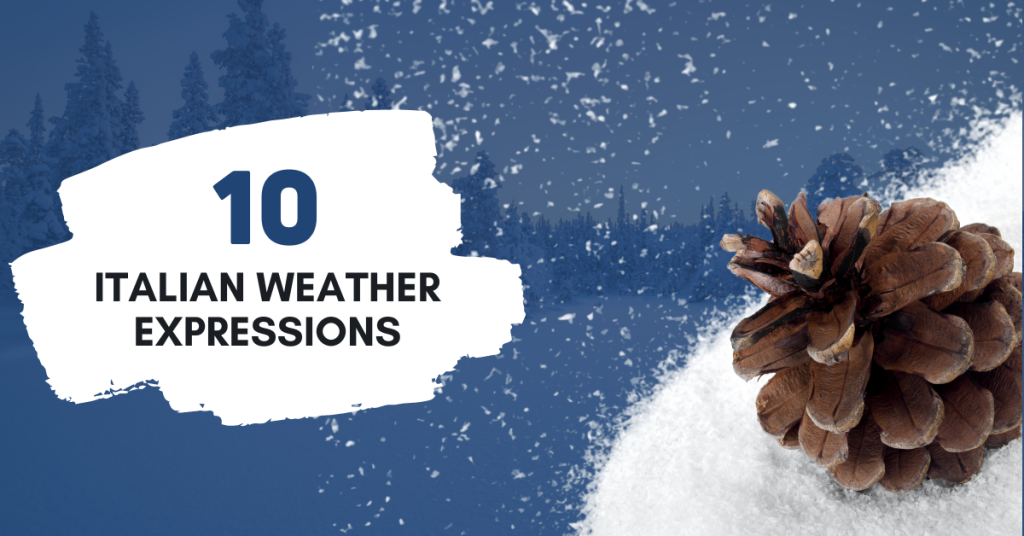How many conversations start with a comment about the weather? How many times have you said, “it’s a beautiful day we’re having,” or “can you believe this cold weather?” to a stranger? The weather can be a great conversation starter or icebreaker when practicing your Italian. Knowing the most common weather expressions in Italian can help.
10 Italian Weather Expressions
1. Fa un freddo cane!
What Does “fa un freddo cane” Mean?
The expression “fa un freddo cane” means “it’s freezing cold” or bitterly cold.
Per esempio: Fa un freddo cane fuori! = It’s freezing cold outside!
What is the Literal Translation?
It’s dog cold!
What’s the Story Behind This Expression?
There are a few theories about where the expression “fa un freddo cane” came from.
One theory is that it comes from the idea of it being a “biting” cold that you can feel in your bones, much like a dog bite.
Another theory is that the expression comes from Eskimos, who used to measure how cold it was by the number of dogs they let into the house to warm up. The colder it was, the more dogs they would let inside.
More than likely, this expression has roots in the old practice of keeping dogs outdoors. Historically, dogs have been used as guardians and lived outside to help protect the home. Because they lived outdoors year-round, dogs were exposed to winter weather and developed a resistance to bitter cold temperatures.
While the dog’s “guardian” role has long since disappeared, this expression still remains.
2. C’è vento
What Does “c’è vento’” Mean?
The expression “c’è vento” means that it’s windy outside.
Per esempio: Oggi fa caldo e non c’è vento! = Today, it’s hot and there is no wind!
What is the Literal Translation?
There is wind!
- C’è = there is
- vento = wind
3. C’è un caldo da morire!
What Does “c’è un caldo da morire” Mean?
It’s extremely hot or unbearably hot.
Per esempio: Qui c’è un caldo da morire! = Here, it is terribly hot!
You may hear Italians using this expression in August, the hottest month of the year – or anytime during the hot summer months.
What is the Literal Translation?
It’s hot to die!
4. Si soffoca
What Does “si soffoca” Mean?
You might use the expression “si soffoca” when it’s so hot you can barely breathe.
Per esempio: Qui dentro c’è molto caldo, si soffoca! = Here inside, it’s so hot, it’s suffocating.
As you can see in this example, you can also use this expression to describe the temperature of a room.
What is the Literal Translation?
It suffocates
- Si = Itself or it
- suffoca = third-person singular form of suffocare, meaning suffocates
5. Si muore di freddo
What Does “si muore di freddo” Mean?
When it’s so cold that you can barely stand to be outside, you might use the expression “si muore di freddo.”
Per esempio: Si muore di freddo sulla montagna! = It’s extremely cold on the mountains!
“Si muore di freddo” simply means that it’s terribly cold outside.
What is the Literal Translation?
One dies from the cold!
6. Si gela
What Does “si gela” Mean?
The term “si gela” is used to describe freezing cold weather.
Per esempio: Si gela qui fuori! = It’s freezing out here.
When temperatures dip below freezing, you can use the phrase “si gela” to describe the weather.
What is the Literal Translation?
One freezes!
7. Non ci sono più le mezze stagioni
What Does “non ci sono più le mezze stagioni” Mean?
The expression “non ci sono più le mezze stagioni” essentially means that spring and autumn aren’t as pleasant as they used to be.
What is the Literal Translation?
There are no more mid-seasons.
- Non ci sono = there are no
- più = more
- le mezze stagioni = mid-seasons
What’s the Story Behind This Expression?
The origins of this expression aren’t clear, but it’s often used to describe how the middle seasons (spring and autumn) aren’t as pleasant as they used to be (or at least they don’t seem to be!). Winters seem to be getting shorter, and summers seem to be getting longer.
When it feels like the weather jumps from freezing to boiling hot, you can use the expression “non ci sono più le mezze stagioni” to lament about the extreme changes.
8. Marzo pazzo pazzerello, vedo il sole prendo l’ombrello
What Does “marzo pazzo pazzerello, vedo il sole prendo l’ombrello” Mean?
This expression is used to describe the weather in March, which is often unpredictable. One minute, it’s sunny. The next, it’s raining. Because you never know what the day’s weather may bring, it’s best to bring an umbrella.
What is the Literal Translation?
Crazy, crazy March, I see the sun I take my umbrella.
9. Piove sempre sul bagnato
What Does “piove sempre sul bagnato” Mean?
The idiom “piove sempre sul bagnato” is the English equivalent of “when it rains, it pours.”
What is the Literal Translation?
It rains always on the wet.
- Piove = it rains (from the word “piovere,” which means “to rain”)
- sempre = always
- sul = on the
- bagnato = wet (the past participle of the verb bagnare, which means “to wet”)
What’s the Story Behind This Expression?
While this proverb talks about rain, it’s usually used to describe the idea that having too much of something makes it useless – like rain on a wet field.
A great example is the common English expression: “The rich get richer, and the poor get poorer.”
In other words, the people who benefit get nothing.
The origin of this proverb has roots in Italian poet Giovanni Pascoli’ writings, who once said:
- Piove sul bagnato: lagrime su sangue, sangue su lagrime. – Giovanni Pascoli
The word “lagrime” is an old form of the word “lacrime,” or tears, and “sangue” translates to “blood.” So, Pascoli says, “rain on the wet: tears on blood, blood on tears.”
10. Piove a catinelle
What Does “piove a catinelle” Mean?
The expression “piove a catinelle” is the English equivalent of “it’s raining cats and dogs.” In other words, it’s pouring rain!
Per esempio: Portatevi l’ombrello perché piove a catinelle. = Bring your umbrella because it’s pouring rain.
What is the Literal Translation?
It’s raining buckets!
Conclusion
Italians love to talk about the weather. These expressions can help spark conversations and break the ice when meeting new people or even when chatting with friends.

